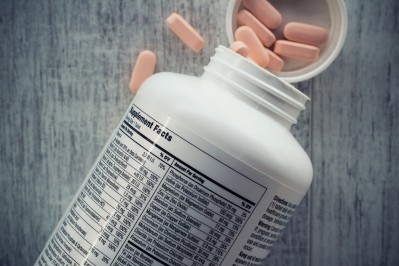Guest Article: NPA Chief on 2022’s industry sagas and what these mean for 2023

Issues directly created by those who don’t see the value and the benefits to health and wellness the industry has brought to the world. Those individuals promulgate issues in States and Federally that the industry is un- or underregulated, not transparent, just interested in profiteering, or worse, harmful to public health on some level. So, while some may be reluctant to pick a side, it’s clear a side has already been picked for us.
Fortunately, most of the country sees through this and believes in self-care, they want to do something daily to maintain their health. During the pandemic, some estimates indicate the number of people using dietary supplements increased by 20 million Americans, meaning even more are willing to trust what we offer. That doesn’t happen by not being transparent, by not being trustworthy, or harming people.
While those who choose to disparage the industry will continue to do such in 2023, we have a choice to make in moving ahead on the issues, choosing to align ourselves with the right side of the issues, not doing so is also making a choice.
Drug exclusion related interpretations – the saga continues
We began 2022 under the fog of drug exclusion interpretation regarding NAC. NPA had just filed its lawsuit against HHS/FDA, following our citizen’s petition to ask for rulemaking on NAC. Our lawsuit proved to be the turning point in securing enforcement discretion, forcing FDA to come to the table on our citizen’s petition while other proposals were completely rejected. We won that important battle for the industry.
While the battlefront on CBD has been waged since 2019, more on that in a second, FDA has added some oddities in the NDI process on NMN to that front. The specific oddities are the agency’s interpretation of when the IND triggers exclusion to the supplement (or food market), the removal of an AKL (never happened before, and if it happened here, it could happen to your NDI), but stranger yet is that the agency went out with a position by administrative position (an NDI response letter) questioning the status of NMN as an ingredient when there are self-GRAS assessments by scientific procedure that clearly establish NMN as a lawful food ingredient (FDA’s words not mine) prior to the IND date.
I repeat, by scientific procedure, NMN is a lawful food ingredient, as the self-GRAS pre-dates the IND, which by the way FDA won’t tell us specifically what that date is.
Similar to NAC, the agency appears to have no safety concerns with NMN. That makes all this wasted motion by the agency that much more troubling in terms of agency priorities, especially in the face of ongoing agency statements where they repeatedly say they’re limited in resources. Well, if limited resources are being spent on things like NAC just to say no or, in the case of NMN, do the bidding of the IND holder (who oddly enough has touted the virtues of NMN supplementation for years) versus finding solutions with the industry, there is a disconnect between the agency’s mission of both promoting and protecting public health.
Added as there was a self-GRAS in place, the companies that sent in NDIs to FDA, are the ones being transparent, as the agency has said on their site, Section 413(a)(1) of DSHEA, exempts an NDI from a premarket notification to FDA if the “supplement contains only dietary ingredients which have been present in the food supply as an article used for food in a form in which the food has not been chemically altered.”
So, if the companies who submitted an NDI, likely at the request of their customers, to add marketing value, hadn’t submitted the NDI, would the agency have made any statements at all? How does this course of action help the NDI program achieve its goal of getting more of the industry to engage in the process with the FDA? These questions weren’t thought of before the agency’s actions on NAC, and looks like they weren’t on NMN.
The good news is we’ve engaged on the issue, and the red tape issues aside, if it takes the same course of action that was required on NAC, if the only way to get the agency to come to the table on interpretive issues of the law with industry is through the judicial branch, so be it, but that’s a clear sign that there is more focus on creating problems versus solving them by our principle regulator.
This past year was another where we saw no movement Federally on CBD legislation. That will likely continue in the next congress until the legislative proposals really push FDA to establish a safe daily amount via rulemaking in a specific timeframe. Some have discussed the farm bill as a vehicle, but as FDA will be providing technical assistance (TA) on any changes to their authority, if we look at their TA from the past two congresses, they jammed up progress with the issue of the daily amount people should consume.
With a new congress in 2023, many are chomping at the bit to find a way forward. If the new proposals are clear on the consumption principle, while it’s no guarantee of passage, they should see more daylight than prior proposals.
FDA ended 2022 with some new messaging on CBD. FDA’s most recent warning letters on CBD is the first time FDA is focused on CBD as a chemical entity as the sole basis for the warning, which FDA doubled down on with their constituent update that takes added pains to spread the FDA’s opinion that there are somehow more significant risks inherent to foods containing CBD than supplements. I’m unaware of the data source FDA is using to make that assumption.
If there is an ongoing safety evaluation on CBD, as the agency received added appropriations for, there needs to be clear communication to all about when that will be completed and when the agency will find a pathway forward on a safe daily amount to consume. NPA submitted a citizen’s petition in 2022, pushing the agency on a case-by-case basis specific to a product or ingredient, conduct an NDI review without invoking the drug exclusion criteria, as is typical with citizen’s petitions, 180 days have come and gone, and still no answer. FDA’s position is that they “still don’t have enough data” to address the big picture, yet if they aren’t willing to review individual submissions on a specific ingredient or product which is consistent with their authority prior to going to market, that isn’t aligned with protecting the public health, that according to Forbes, 60% of the country has used a CBD product.
One thing is clear, extensive energy, resources, and time was spent combatting destructive “DSHEA 2.0” proposals in 2022. Some think mandatory product listing is the most important thing the industry needs to address (we’ll deal with that in a moment).
Others think topics from third-party inspections to virtual inspections are the key, but given the continued actions driven by the agency to limit the development of products and new ingredients by using their interpretation of the drug exclusion clause.
Mr. Bond, they have a saying in Chicago: "Once is happenstance. Twice is a coincidence. The third time it’s enemy action.”
It’s clear that until we address this issue legislatively, and we at NPA will be looking to do just that, as we did on NAC, it will continue to be one of the most urgent and important issues we will face as an industry in 2023. The starter kit for “DSHEA 2.0” should be limited to addressing this issue and pre-empting the states from establishing a regulatory system with 51 regulators. Anything else is not coming from the side of the industry and only feeds the narrative against the industry.
States and Snakes alive
The states were a challenge in 2022 and will continue to be in 2023. Specifically, the advancing of the narrative by STRIPED that the industry is harmful and underregulated, leading to eating disorders in adolescents, through the sales of either weight loss or muscle-building products at brick-and-mortar retail, most of the proposals stay away from the internet/e-tailers. All bills restrict access through location in the store (behind the counter) or ID checks.
This is the STRIPED methodology: Treat our industry, the health and wellness industry, like Tobacco, all in the name of helping the children. They say it boldly on their site and in their testimonies. We have asked them to engage with the industry. To discuss why there isn’t a single adverse event report at FDA establishing a relationship between a dietary supplement and an eating disorder. They have no interest in doing that, only in maligning the industry.
Now we dodged a bullet in California as at the eleventh hour, Gov. Gavin Newsom vetoed the bill that passed both the Senate and Assembly, we were the only association that opposed the bill, the only one that asked for a veto, and somehow, it happened. Big thanks to all of those who took the time to contact the legislature and Governor’s office in California. Your letters, emails, and calls played a significant role in making that veto happen. While Newsom’s letter about why vetoing such bills is the right thing for states to do should be distributed far and wide, other states seem bent on following their own course.
In New York, Governor Kathy Hochul requested the bill be sent to her desk, which means her signature is likely. As I write this in December, NJ is moving its version of the bill through their Assembly and Senate.
You may ask why these proposals move, even though they have zero science behind them. Simply put, approximately 50% of the US Congress once served in state assemblies and senates. Our industry gets attention in the media, and those with aspirations get more attention from attacking our industry than they do for anything else they propose as state legislators. They use the industry to raise money and their profile.
So, what does that mean to the industry? It means that those that advance the narratives that we’re un/underregulated or risky or worse are unsafe aren’t on the side of the industry and will never be; the issues flat out aren’t aligned. They don’t want to discuss or debate the merits of the issues or the industry. They want to use the issue to get to something that is personally more important to them.
That’s not our industry, it’s being elected to a higher office or re-elected, not learning about the industry. Their ears will never be receptive to the messaging about all the good the industry does. This makes our approach and our ability to mobilize, which was tremendous in 2022, will be even more critical in 2023 than 2022, an effort that yielded hundreds of thousands of emails to congress.
That’s a significant statement, but it will require a greater effort. In 2022, there was an outpouring of effort, specifically the grassroots, against the dangers of the passage of so-called “mandatory product listing.” Sounds harmless enough, but the supporters of the bill, some of whom claim to represent the industry, can’t explain how the new authorities they want to give to FDA won’t be used for overreach. Specifically, if you pass the agency a public-facing list and things like NAC, NMN, CBD, or any other product or ingredient where there’s disagreement on the interpretation of exclusion clauses can be kept off the list by the FDA, the business, retailers and other sales platforms, not to mention insurance, won’t do business with those left off the list.
Subsequently, brands, companies, and manufacturers can be eliminated with a stroke of a pen from the FDA without recourse. NMN, NAC, CBD, and others would be effectively gone, while scientific or technical issues on such ingredients with the agency would never be resolved. People can try to give it a more pleasant name, but that’s premarket approval, albeit not the same way FDA regulates drugs. In many ways, it’s much worse.
The good news is that because of the efforts of all of you who wrote, called, and visited members of Congress, the industry was able to keep MPL off the must-pass User Fee Authorization and then off the end-of-year government omnibus budget.
With your help, NPA was able to get over 85,000 messages to your elected officials, resulting in critical actions like the bipartisan letter from Congressmen Cardenas and Duncan, advocating congressional leadership that MPL had no place in the UFAs. NPA is approaching its 90th year, and if 2022 showed anything, it showed NPA continues to be your leading advocate for the industry and those who support it.
Windshield, not the rearview mirror
While there are always things to learn from looking backward, progress can only happen if we look ahead. One can count on the industry locking horns with the states, pushing back on MPL proposals, and figuring out a way forward on drug exclusion criteria with FDA in 2023.
There are more things to be excited about. Per the IRS, you cannot use your HSA/FSA to pay for vitamins or supplements taken for general health or to pay without a prescription. This new congress will be where we advance Flex Spending Accounts and Health Savings accounts further than ever before. In terms of the industry having a larger, more considerable, more significant impact on health and wellness and saving the country money through prevention, 32 million Americans had an HSA at the end of 2021. The average account for a family is about $7,500, and for individuals, it is about $4,300. The simple math when supplements are covered by the IRS is only a positive for our country’s health and wellness.
States, too aren’t just interested in making challenges for our industry. Some states, like the other Washington, not D.C., are looking at exempting supplements from sales tax; others are looking at tax holidays, sort of like school supplies get the week before school starts. The entire industry should get behind these proposals industry the whole industry as it not only extends those who currently use supplements value proposition but attracts new interest.
Similarly, during the last congress, the CHIPS Act was passed to focus on infrastructure for making microchips domestically. Provisions in that bill serve as the framework to develop manufacturing capacity in the US for our industry. This is exciting, as we all saw during the pandemic that adapting our supply chain to be closer to home will be necessary for our industry in the future. It will take years to develop new allies in government, but these initiatives will carry us forward as the industry.
The Reagan-Udall foundation just finished its external review of CFSAN. While supplements specifically were left off of the report by FDA’s choosing, the report has drawn interest from members of congress on both sides of the aisle on how to make sure the F in FDA is no longer silent, as the joke has been told many times now. While that will yield some debate on possibly moving food out of the FDA, congress has definitively zeroed in on the need for investigation and oversight into how the FDA is conducting its business on foods and meeting the needs of all Americans, yes that includes the industry, as a public health agency.
None of these things can happen without the most important development that will take place in 2023. You. With the re-opening of congressional offices and state houses for sessions, we have the ability to once again meet face-to-face with lawmakers. This is how we let them know all the good our industry does, from job creation to keeping bones strong with calcium and vitamin D, one thing is for sure, we’ll re-establish relationships with old friends and make some new ones on the way.
In 2023 we will be bringing back our fly-in day, the widest attended in the industry, we will see you there, or we will work with all of you to interface with your lawmakers back home. After all, this is what makes the difference when it comes to the industry and knowing who is on our side and, more importantly, who has our back.

























